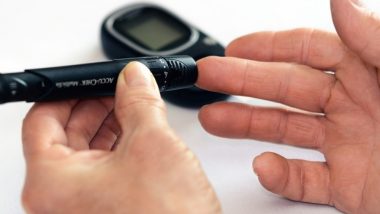Diabetes, a chronic health condition, was responsible for claiming 4 million lives worldwide. The metabolic disorder is caused when the pancreas does not produce enough insulin to regulate the body’s blood sugar. In time, excessive glucose in the blood becomes toxic to the body and starts damaging organs and blood vessels. Even more worryingly, only 16 percent of diabetes cases are diagnosed on time; rest are discovered accidentally. On November 14 every year, WHO and International Diabetes Federation observe World Diabetes Day to raise awareness about diabetes and to commemorate the birthday of Sir Frederick Banting who invented the insulin. On the occasion, our experts answer pertinent questions related to the symptoms, causes, risks and treatment options for diabetes.
What is Diabetes?
“Diabetes, a disease that affects our body results from producing less than required insulin, a hormone that transfers energy to body cells, and/or due to our body cells becoming resistant to the actions of insulin,” says Dr Srinivasa P Munigoti, Consultant Diabetes, and Endocrinology, Fortis Hospital, Bangalore.
The pancreas secretes insulin, which regulates blood sugar levels and “unlocks” the cells to allow sugar inside for generating energy. But sometimes, the body faces a deficiency of insulin, either because the pancreas is not generating it or because the immune system is attacking the cells that create insulin. World Diabetes Day 2018: 5 Reasons Why This Year’s Theme ‘The Family and Diabetes’ is Important.
When this happens, there is excessive sugar in the blood, which over time can turn toxic for the internal organs. When the blood sugar levels reach 130 mg/dl on an empty stomach or higher than 180 mg/dl two hours a meal, the person is diagnosed with diabetes. Women's Health Deteriorate More Rapidly Than Men Prior to Diabetes.
What Are The Types of Diabetes?
There are three types of diabetes, type 1, type 2 and gestational diabetes. “In type 1, the body no longer produces insulin and is commonly seen in young children and adolescents whereas in type 2 pancreas does not produce enough insulin that body cells can use properly,” says Dr Munigoti.
Gestational diabetes affects pregnant women, lasting as long as the pregnancy. It’s caused when the placenta creates hormones that cause fluctuations in the blood sugar levels. How Does Diabetes Cause Heart Diseases In Indians At A Young Age?
What are The Symptoms of Diabetes?
The signs and symptoms of diabetes are often disregarded by patients at the early stages, which is why most diabetes diagnoses are often accidental. The damage starts years before the first signs of the disease become apparent. Recognising these early symptoms can help prevent many complications. Air and Noise Pollution Increases Your Risk of Heart Diseases and Diabetes
- Frequent urination
- Excessive thirst
- Weight gain
- Weight loss
- Irritability
- Blurred vision
- Frequent fatigue
- Repeated infections of genitals, skin, mouth and urinary tract
- Delayed wound healing
- Dry mouth
- Numbness of feet
- Itching
- Erectile dysfunction
“These are few of the common symptoms that one can experience due to inadequate function or absence of insulin in one’s body cell,” says Dr Munigoti. How You Can Enjoy Sweets If You Have Diabetes, A Doctor Explains.
What Are The Risk Factors For Diabetes?
Studies in India have shown that there are a number of risk factors that can be identified beforehand to treat the disease at the earliest. These include:
- Age above 35 years
- Obesity or being overweight
- Hypertension
- Recent weight gain
- Sedentary lifestyle
- Enlarged upper body
- A family history of diabetes
Dr Aarti Ullal from Global Hospitals, Mumbai says that several gene mutations can interact with the environmental factors to increase the risk of diabetes.
What Causes Diabetes?
The causes of diabetes depend on the type. Type 1 diabetes is an autoimmune condition, according to Dr Munigoti. “The antibodies from one’s own body destroys one’s insulin-producing cells. The cause of this phenomenon remains poorly understood, with no identifiable risk factors,” he adds.
In contrast with type 1, the factors that trigger type 2 diabetes mellitus are genetic. “A history of the disease running in the family, along with lifestyle factors like diet, obesity, stress and sedentary lifestyle add to the risk,” Dr Munigoti adds.
Watch Video:
How is Diabetes Treated?
Dr Munigoti says, “The major step in maintaining diabetes is to have a controlled blood sugar in the normal range with the help of diabetes medications, weight reduction, proper diet, regular exercise, advice from your health professional (doctors) and nutritionists.”
Insulin therapy is used as a treatment method for type 1 diabetes, along with exercise and diet.
Type 2 diabetes mainly focuses on weight reduction, diabetes medication and exercise. Drugs such as metformin, sulfonylureas, meglitinides, thiazolidinediones, DPP-4 inhibitors, etc. are the mainstay of treating diabetes.
Since obesity is a risk factor, some treatments also call for invasive weight loss procedures like bariatric surgery.
(The above story first appeared on LatestLY on Nov 14, 2018 02:46 PM IST. For more news and updates on politics, world, sports, entertainment and lifestyle, log on to our website latestly.com).













 Quickly
Quickly


